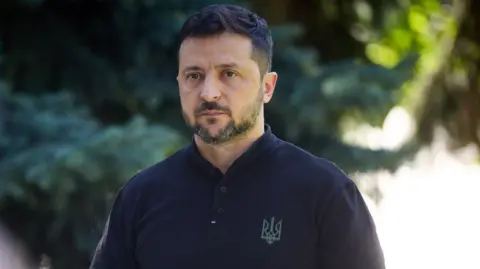Ukrainian President Volodymyr Zelensky has rejected proposals for a buffer zone between Ukrainian and Russian forces as part of a peace deal, arguing it does not reflect the realities of modern warfare.
Only those who do not understand the technological state of today's war propose a buffer zone, he told reporters on Friday.
This statement came after reports surfaced suggesting European leaders were considering a 40km (25-mile) buffer zone as part of either a ceasefire or longer-term agreement. The conflict has morphed into one driven significantly by drone technology; hence, Zelensky suggested a buffer zone already existed due to the risks of drone strikes near the front line.
Buffer zones have historically created demilitarized areas between opposing forces, similar to the division between North and South Korea or the Iron Curtain post-World War Two. Diplomats indicated a proposal was being considered for a land strip in Ukraine to be designated between the two forces.
However, Zelensky stated that an informal buffer zone already exists, as heavy artillery from both sides cannot operate effectively due to the drone threat. Today, our heavy weapons are located at a distance of more than 10 km from each other because everything is hit by drones, he explained.
He referred to this area as a dead zone or grey zone, emphasizing that it has already rendered traditional buffer zone strategies ineffective. Zelensky also rebuffed any notion that Ukraine would concede territory within such a buffer, stating that if Russia seeks greater distance, they should retreat into the areas they have temporarily occupied.
Zelensky concluded that Russia is not currently inclined toward genuine diplomacy, instead pursuing methods to delay the end of the war.
A US-led diplomatic effort aimed at concluding Russia's ongoing conflict, which has extended beyond 40 months, appears to be losing momentum. Recent high-level discussions raised initial hopes for a potential meeting between Zelensky and Russian President Vladimir Putin, but diminished prospects have emerged as European leaders amplify calls for more sanctions against Russia.
In light of intensifying assaults—such as a recent drone and missile strike on Kyiv that resulted in 23 fatalities—Zelensky's administration has reaffirmed its intent to seek robust security guarantees from European allies to bolster Ukraine's defense capabilities in light of stalled peace negotiations.


















